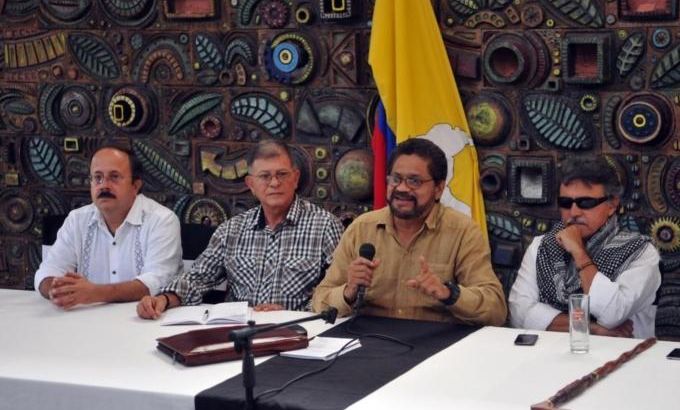Land reform key for Colombia peace talks
FARC rebel fighters say 87 percent of peasants have no land, and changing this a major goal of talks in Cuba.

Havana, Cuba and Bogota, Colombia – Colombian government and guerrilla delegates have announced an agreement on the question of land reform – an important step in the peace talks that began six months ago in Havana.
“This first document…is the ‘golden gate’ for the continuation of talks on the rest of the issues,” Revolutionary Armed Forces of Colombia (FARC) negotiator Andrés París said shortly after Sunday’s announcement.
“This is a firm step towards a final agreement to end the conflict,” he said, adding that the peace process “is being strengthened as the government’s spirit of change and reform grows stronger and as Colombians begin to see a future of peace in these talks, as well as changes that benefit them and improve their living conditions.”
A Latin American diplomat close to the talks said that it was important that the positions of the government of conservative President Juan Manuel Santos and the FARC insurgents had come closer together on the question of rural development, and that the talks could now move forward on other issues on the agenda.
Land reform is the first item on the agenda for the peace talks aimed at putting an end to the conflict that began in 1964, when the FARC emerged on the scene.
The document on “integral land reform” clarifies however that implementation depends on the talks reaching a final peace accord, as one of the principles guiding the process is that “nothing is agreed until everything is agreed”.
Accords on different points on the agenda “will only be applied once we have an overall agreement to end the conflict. In other words: there will be no partial application of the accords,” said chief government negotiator Humberto de la Calle.
Still waiting for final agreement
FARC chief Iván Márquez said the agreement on land reform was vague on some points, “which will necessarily have to be taken up again before a final agreement is reached.”
These specific aspects apparently include the maximum permitted extension of large landed estates and foreign-owned rural property.
“Everything will be done with full respect for private property and the rule of law. Legal property owners have nothing to fear,” said de la Calle, who added that the agreement would radically transform rural Colombia and that it went beyond the traditional view of agrarian reform and was aimed at closing the gap between rural and urban Colombia.
Everything will be done with full respect for private property and the rule of law. Legal property owners have nothing to fear.
FARC sources have said that in Colombia, where no real land reform process has ever been carried out, there are estates of up to 100,000 hectares in size, while 87 percent of peasants have no land.
And according to the Gini Index, which measures income inequality on a scale of 0 to 1, land concentration in Colombia increased in the last decade from 0.74 to 0.87 – one of the most unequal distributions of land in the world.
The joint communiqué says the agreement on land issues would mean the start of radical transformations of rural Colombia, based on equality and democracy, by granting access to land for the largest possible number of landless peasants by means of a land bank, or “Fondo de Tierras para la Paz”.
The accord also covers housing plans, the provision of tap water, technical assistance and training, access to education, formal land titling, infrastructure, and soil recovery. “The agreement seeks to reverse the effects of the conflict and restore land to the victims of dispossession and forced displacement,” the document states.
“With the future generations of Colombians in mind, the accord delimits the agricultural frontier, protecting areas of special environmental interest,” it adds.
In addition, it says a food and nutrition system would be put in place as a form of social protection, to eradicate hunger.
The next round of talks, set to begin on June 11, will focus on the question of political participation – FARC’s transition to a legal political movement. Other points on the agenda are an end to the armed conflict, the drug trade, victims’ rights and reparations, and mechanisms to oversee implementation of the agreements.
President Santos called the agreement on land issues “a fundamental step towards a final accord to put an end to half a century of conflict.”
“We will continue the process in a prudent and responsible fashion,” he wrote on Twitter.
In this stage of the talks, “these accords cannot be very concrete; they are just a framework,” sociologist Alfredo Molano, an expert on the conflict over land, said.
A similar process will now follow with the remaining five points on the agenda, and after that, concrete details and numbers will be hashed out.
Molano stressed that the aspects on which agreement was reached included the gradual process of issuing formal title to all of the land occupied or possessed by peasants in Colombia.
“We’re talking about two million hectares,” he said. “Today there are six peasant reserve zones (ZRCs) with a total of 800,000 hectares, and another five, covering 1.2 million hectares, are in the process of being created.”
The ZRCs are areas of collectively-owned rural land. But although they were recognised by law in 1994, they continue to battle for full recognition.
They curb the constant encroachment of the agricultural frontier in forested areas, and are considered a good formula to curtail the steady growth of latifundios or large landed estates.
A version of this story was first published by Inter Press Service (IPS) news agency.